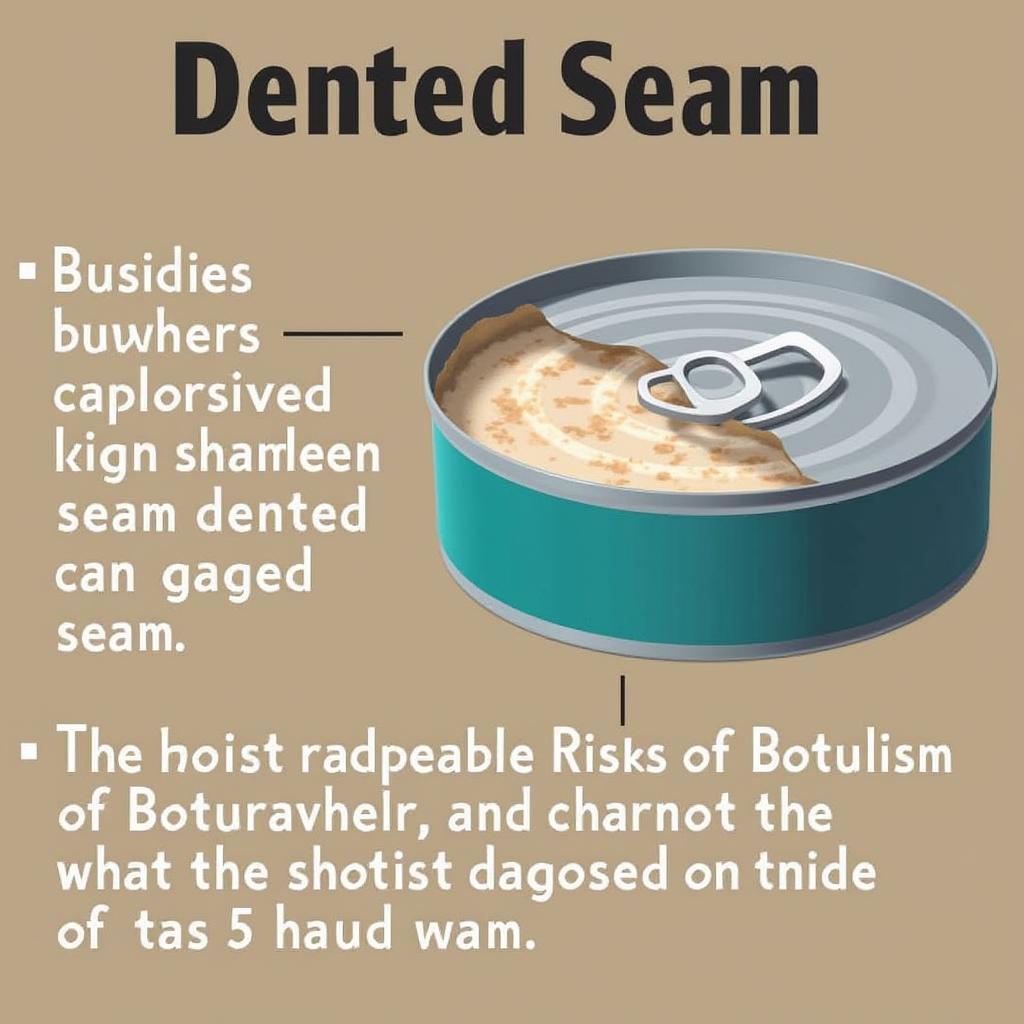Are Dented Cat Food Cans Safe to feed your feline friend? It’s a question many cat owners ponder as they browse the supermarket aisles or unpack their online grocery deliveries. While a small dent might seem harmless, it can sometimes indicate a more serious issue that could compromise the safety of the food inside. This article will delve into the details of dented can safety, providing you with the knowledge you need to make informed decisions about your cat’s nutrition.
Are dented cans always a cause for concern? Not necessarily. Let’s explore the different types of dents and the potential risks they pose. See our resources on canes food safety for more detailed information on the topic.
Understanding Dent Types and Risks
Shallow Dents vs. Deep Dents
A shallow dent, one that doesn’t break the metal’s surface or create a sharp crease, is generally safe. These dents are often cosmetic, occurring during shipping or handling, and don’t affect the food’s integrity. However, a deep dent, especially one with sharp edges or punctures, is a red flag. This type of damage can compromise the can’s airtight seal, allowing bacteria and other contaminants to enter and spoil the food. Feeding your cat spoiled food can lead to various health problems, ranging from mild digestive upset to severe food poisoning.
The Importance of the Seam
Pay close attention to the can’s seams. If a dent affects the seam, even a shallow one, it’s best to err on the side of caution and discard the can. Damaged seams are more susceptible to leakage and bacterial contamination.
Why Are Dented Cat Food Cans Risky?
Botulism: A Serious Threat
One of the most significant risks associated with dented cans is botulism, a severe form of food poisoning caused by the bacterium Clostridium botulinum. This bacterium thrives in anaerobic environments, like the inside of a sealed can, and produces a potent neurotoxin that can be fatal to cats. Even a tiny puncture in a dented can can introduce this bacterium, putting your cat’s health at risk.
Other Bacterial Contamination
Besides botulism, dented cans can harbor various other bacteria that can cause foodborne illnesses. These bacteria can multiply rapidly in spoiled food, leading to vomiting, diarrhea, and other unpleasant symptoms in your cat.
 Dented Can Seam Damage and Botulism Risk
Dented Can Seam Damage and Botulism Risk
How to Identify a Compromised Can
Beyond examining the dent itself, there are other signs that a can might be compromised. Look for:
- Bulging Cans: A bulging can is a clear sign of bacterial growth and gas production inside. Never feed your cat food from a bulging can.
- Leaks or Seepage: Any leakage around the seams or dents indicates a broken seal and potential contamination.
- Foul Odor: Spoiled cat food often has a rancid or off-putting smell. If the food smells unusual, it’s best to discard it.
- Unusual Texture or Color: If the food inside looks different than usual, it could be a sign of spoilage.
What to Do If You Find a Dented Can
If you’re unsure about the safety of a dented can, it’s always best to err on the side of caution. Don’t take any chances with your cat’s health. Return the dented can to the store for a refund or exchange, or contact the manufacturer directly. You can find helpful advice on managing your canned food delivery to minimize such issues.
Dr. Amelia Parker, DVM, a renowned veterinary nutritionist, emphasizes the importance of caution: “When it comes to your pet’s food, it’s always better to be safe than sorry. A dented can might seem like a small thing, but it could have serious consequences for your cat’s health.”
Conclusion: Prioritizing Your Cat’s Safety
When it comes to the question, “Are dented cat food cans safe?” the answer is: it depends. While minor dents might not pose a threat, deeper dents, particularly those affecting the seams, can compromise the food’s safety. Always inspect cans carefully, look for signs of spoilage, and err on the side of caution. Your cat’s health is worth the extra precaution. Check out our guide on food storage 10 cans for tips on how to properly store your canned goods and minimize the risk of damage.
FAQ
-
Can I feed my cat food from a slightly dented can?
- If the dent is shallow and doesn’t affect the seam, it’s generally safe.
-
What are the signs of botulism in cats?
- Symptoms include weakness, paralysis, difficulty breathing, and dilated pupils.
-
How should I store canned cat food?
- Store unopened cans in a cool, dry place. Once opened, refrigerate leftovers in an airtight container.
-
What should I do if my cat eats food from a dented can and gets sick?
- Contact your veterinarian immediately.
-
Can dented cans be returned to the store?
- Most stores will accept returns or exchanges for dented cans.
-
How can I prevent cans from getting dented during shipping?
- Order from reputable online retailers who use proper packaging.
-
Is dry cat food a safer alternative to canned food?
- Dry food has a longer shelf life but can also be susceptible to spoilage if not stored properly.
Need Help?
When you need support, please contact us via Phone: 02437655121, Email: minacones@gmail.com Or visit us at: 3PGH+8R9, ĐT70A, thôn Trung, Bắc Từ Liêm, Hà Nội, Việt Nam. We have a 24/7 customer service team.